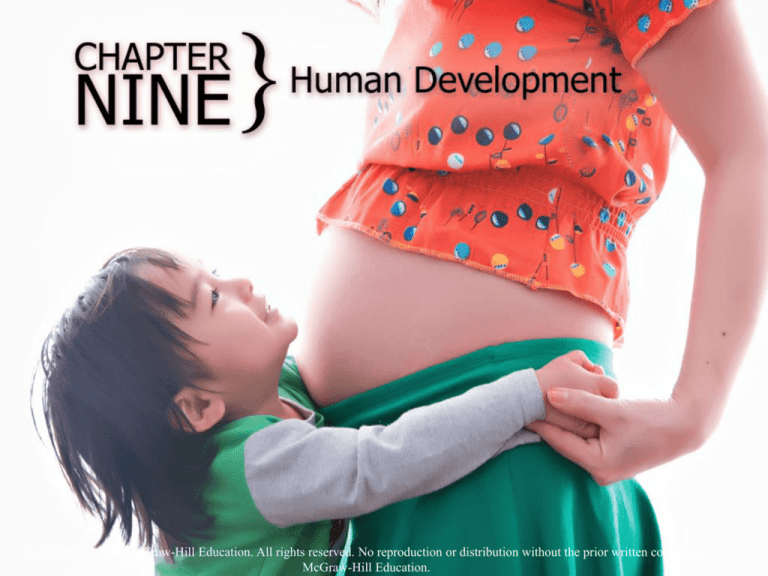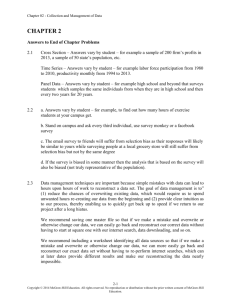
Copyright © 2014 McGraw-Hill Education. All rights reserved. No reproduction or distribution without the prior written consent of
McGraw-Hill Education.
CHAPTER PREVIEW
• Exploring Development
• Child Development
• Adolescence
• Adulthood and Aging
• Health and Wellness
Copyright © 2014 McGraw-Hill Education. All rights reserved. No reproduction or distribution without the prior written consent of
McGraw-Hill Education.
9-2
DEVELOPMENT
The pattern of continuity and change in human capabilities that
occurs throughout life.
– Growth
– Decline
Copyright © 2014 McGraw-Hill Education. All rights reserved. No reproduction or distribution without the prior written consent of
McGraw-Hill Education.
9-3
DEVELOPMENT
Copyright © 2014 McGraw-Hill Education. All rights reserved. No reproduction or distribution without the prior written consent of
McGraw-Hill Education.
9-4
RESEARCH METHODS IN DEVELOPMENTAL PSYCHOLOGY
Age-Related Differences
– cross-sectional studies
cohort effects
– longitudinal studies
Copyright © 2014 McGraw-Hill Education. All rights reserved. No reproduction or distribution without the prior written consent of
McGraw-Hill Education.
9-5
NATURE AND NURTURE
• Nature
biological inheritance
• Nurture
environmental experiences
• Self
individuals take active roles in
own development
Copyright © 2014 McGraw-Hill Education. All rights reserved. No reproduction or distribution without the prior written consent of
McGraw-Hill Education.
9-6
RESILIENT CHILDREN
Which has a greater impact:
early or later experience?
Resilience
– a person’s ability to recover
from or adapt to difficult times
– Resilient children become
capable adults.
Copyright © 2014 McGraw-Hill Education. All rights reserved. No reproduction or distribution without the prior written consent of
McGraw-Hill Education.
9-7
PRENATAL DEVELOPMENT
• Germinal Period (Weeks 1-2)
– conception
– fertilization
– zygote
• Embryonic Period (Weeks 3-8)
– differentiation of tissue
– organ formation
• Fetal Period (Months 2-9)
– development of functionality
Copyright © 2014 McGraw-Hill Education. All rights reserved. No reproduction or distribution without the prior written consent of
McGraw-Hill Education.
9-8
PRENATAL DEVELOPMENT
• Teratogens are agents that cause
birth defects
– nicotine
– alcohol
– STIs
• Effects of teratogens depend on…
– timing of exposure
– genetic characteristics
– postnatal environment
Copyright © 2014 McGraw-Hill Education. All rights reserved. No reproduction or distribution without the prior written consent of
McGraw-Hill Education.
9-9
PHYSICAL DEVELOPMENT
Reflexes are genetically wired behaviors.
Some are crucial for survival.
– persist throughout life
• coughing, blinking, yawning
– disappear with neurological
development
• grasping, rooting, moro
Copyright © 2014 McGraw-Hill Education. All rights reserved. No reproduction or distribution without the prior written consent of
McGraw-Hill Education.
9-10
PERCEPTUAL AND MOTOR DEVELOPMENT
• Motor Skills
– locomotion
– reach & grasp
• Preferential Looking
– give “choice” and
measure preferences
Copyright © 2014 McGraw-Hill Education. All rights reserved. No reproduction or distribution without the prior written consent of
McGraw-Hill Education.
9-11
BRAIN DEVELOPMENT
• Myelination continues after birth.
• Synaptic connections increase dramatically.
• Brain mass increases dramatically.
Copyright © 2014 McGraw-Hill Education. All rights reserved. No reproduction or distribution without the prior written consent of
McGraw-Hill Education.
9-12
COGNITIVE DEVELOPMENT
Jean Piaget (1896-1980)
Children actively construct their cognitive
world using:
– Schemas
concepts or frameworks that organize
information
– Assimilation
incorporate new info into existing
schemas
– Accommodation
adjust schemas to new information
Copyright © 2014 McGraw-Hill Education. All rights reserved. No reproduction or distribution without the prior written consent of
McGraw-Hill Education.
9-13
PIAGET’S THEORY
• Sensorimotor Stage (birth - 2 years)
– coordinate sensations with movements
– object permanence
– progress from reflexive action to
symbolic thought
• Preoperational Stage (2 - 7 years)
– symbolic thinking: words & images
– intuitive reasoning
– egocentrism
Copyright © 2014 McGraw-Hill Education. All rights reserved. No reproduction or distribution without the prior written consent of
McGraw-Hill Education.
9-14
PIAGET’S THEORY
• Concrete Operational Stage (7 – 11 yrs)
– operational thinking (e.g., conservation)
– classification skills
– reason logically in concrete contexts
• Formal Operational Stage (11-15 yrs)
– lasts through adulthood
– abstract and idealistic thought
– hypothetical-deductive reasoning
Copyright © 2014 McGraw-Hill Education. All rights reserved. No reproduction or distribution without the prior written consent of
McGraw-Hill Education.
9-15
EVALUATING PIAGET’S THEORY
• Underestimated Infant Object Permanence
(as well as other child abilities)
• Overestimated Adolescent/Adult Hypothetical-Deductive
thought
• Culture and education also influence development.
Copyright © 2014 McGraw-Hill Education. All rights reserved. No reproduction or distribution without the prior written consent of
McGraw-Hill Education.
9-16
OTHER THEORIES OF INTELLECTUAL DEVELOPMENT
• Baillargeon and Nativist Approach
• Vygotsy’s Sociocultural Cognitive Theory
– child as apprentice to expert adults
• Information-Processing Theory
– memory
– executive function
Copyright © 2014 McGraw-Hill Education. All rights reserved. No reproduction or distribution without the prior written consent of
McGraw-Hill Education.
9-17
TEMPERAMENT
an individual’s behavioral style or characteristic way of responding
• Three Clusters of Temperament
Easy
Difficult
Slow-to-Warm-up
• Other Perspectives on Temperament
Effortful Control / Self-Regulation
Inhibition
Negative Affectivity
Copyright © 2014 McGraw-Hill Education. All rights reserved. No reproduction or distribution without the prior written consent of
McGraw-Hill Education.
9-18
INFANT ATTACHMENT
the close emotional bond between an infant and its caregiver
may provide important foundation for
subsequent development
Copyright © 2014 McGraw-Hill Education. All rights reserved. No reproduction or distribution without the prior written consent of
McGraw-Hill Education.
9-19
INFANT ATTACHMENT
Harlow Study
– infant rhesus monkeys
– Is it nourishment or contact that matters?
– chose between two surrogate “mothers”
• wire mother with food
versus cloth mother
• Infants preferred cloth mother
across situations.
– Contact comfort is critical to attachment.
Copyright © 2014 McGraw-Hill Education. All rights reserved. No reproduction or distribution without the prior written consent of
McGraw-Hill Education.
9-20
INFANT ATTACHMENT
• John Bowlby
– Infant attachment lays foundation for all future relationships.
• Mary Ainsworth – Strange Situation Test
– Caregivers leave infant alone with stranger, then return.
– Secure attachment or insecure attachment?
Copyright © 2014 McGraw-Hill Education. All rights reserved. No reproduction or distribution without the prior written consent of
McGraw-Hill Education.
9-21
SOCIOEMOTIONAL DEVELOPMENT
Erik Erikson (1902-1994)
– Theory emphasizes lifelong development.
– Eight psychosocial stages of development
– Each stage represents a developmental
task.
• crisis that must be resolved
• personal competence or weakness
Copyright © 2014 McGraw-Hill Education. All rights reserved. No reproduction or distribution without the prior written consent of
McGraw-Hill Education.
9-22
ERIKSON’S THEORY
First Four Stages: Childhood
– trust versus mistrust
basic needs met by sensitive caregivers
– autonomy versus shame and doubt
discover and assert will of their own
Copyright © 2014 McGraw-Hill Education. All rights reserved. No reproduction or distribution without the prior written consent of
McGraw-Hill Education.
9-23
ERIKSON’S THEORY
First Four Stages: Childhood
– initiative versus guilt
challenged to assume responsibility
– industry versus inferiority
mastering knowledge & intellectual
skills
Copyright © 2014 McGraw-Hill Education. All rights reserved. No reproduction or distribution without the prior written consent of
McGraw-Hill Education.
9-24
EVALUATING ERIKSON’S THEORY
• Primary focus on case-study research
• Omitted important developmental tasks
Copyright © 2014 McGraw-Hill Education. All rights reserved. No reproduction or distribution without the prior written consent of
McGraw-Hill Education.
9-25
BAUMRIND’S PARENTING STYLES
• Authoritarian
– parents are controlling and punitive
– correlated with child’s lack of initiative, poor communication
skills, social incompetence
• Authoritative
– parents encourage
independence with limits
– correlated with child’s
social competence, social
responsibility, and
self-reliance
Copyright © 2014 McGraw-Hill Education. All rights reserved. No reproduction or distribution without the prior written consent of
McGraw-Hill Education.
9-26
BAUMRIND’S PARENTING STYLES
• Neglectful
– parents generally uninvolved
– correlated with less social competence and poor selfcontrol in child
• Permissive
– parents are involved, but
place few limits
– correlated with child’s poor
social competence, lack of
respect for others, poor
self-control
Copyright © 2014 McGraw-Hill Education. All rights reserved. No reproduction or distribution without the prior written consent of
McGraw-Hill Education.
9-27
MORAL DEVELOPMENT
Kohlberg (1927-1987)
presented moral dilemmas and analyzed responses
• Preconventional
– behavior guided by punishments and rewards
• Conventional
– standards learned from parents and society
• Postconventional
– contracts, rights and abstract principles
Copyright © 2014 McGraw-Hill Education. All rights reserved. No reproduction or distribution without the prior written consent of
McGraw-Hill Education.
9-28
EVALUATING KOHLBERG’S THEORY
• Moral Reasoning ≠ Moral Behavior
– what we say and do are not always consistent.
• Misses Gender-Related Reasoning Styles
– justice perspective (men) < Kohlberg
– care perspective (women) < Gilligan
Copyright © 2014 McGraw-Hill Education. All rights reserved. No reproduction or distribution without the prior written consent of
McGraw-Hill Education.
9-29
CURRENT RESEARCH ON MORAL DEVELOPMENT
• Prosocial Behavior
– correlated with supportive parenting
– correlated with self-control
• Conscience Formation
– forms by age 3 and carries
over into adulthood
– parent-child interactions
• clear, elaborate, rich with
emotional content
• shared positive emotion
Copyright © 2014 McGraw-Hill Education. All rights reserved. No reproduction or distribution without the prior written consent of
McGraw-Hill Education.
9-30
MORAL DEVELOPMENT
Parenting Strategies Associated with Morality in Children:
– warm and supportive rather than harsh
– reasoning with child when disciplining
– help child learn to take others’
perspective
– involve child in decision making
– model moral behavior and thinking
Copyright © 2014 McGraw-Hill Education. All rights reserved. No reproduction or distribution without the prior written consent of
McGraw-Hill Education.
9-31
UNDERSTANDING ADOLESCENCE
Transition from Childhood to Adulthood
– starts age 10-12
– ends age 18-21
Copyright © 2014 McGraw-Hill Education. All rights reserved. No reproduction or distribution without the prior written consent of
McGraw-Hill Education.
9-32
ADOLESCENT PHYSICAL DEVELOPMENT
• Puberty
– rapid skeletal and sexual maturation
– puberty begins at beginning of adolescence
• Testosterone (androgen) — boys
– genital development,
height, voice changes
• Estrodiol (estrogen) — girls
– breast, uterine, and skeletal
development
Copyright © 2014 McGraw-Hill Education. All rights reserved. No reproduction or distribution without the prior written consent of
McGraw-Hill Education.
9-33
ADOLESCENT BRAIN DEVELOPMENT
• Early
amygdala
emotions
• Late
prefrontal cortex
reasoning and decision
making
risk taking
Copyright © 2014 McGraw-Hill Education. All rights reserved. No reproduction or distribution without the prior written consent of
McGraw-Hill Education.
9-34
COGNITIVE DEVELOPMENT
Piaget’s Formal Operational Stage
Adolescent Egocentrism
– the belief that others are as preoccupied with the
adolescent as he or she is
– sense of uniqueness
– sense of invincibility
risky behaviors
Copyright © 2014 McGraw-Hill Education. All rights reserved. No reproduction or distribution without the prior written consent of
McGraw-Hill Education.
9-35
SOCIOEMOTIONAL DEVELOPMENT
• Erikson: Psychosocial Development
Identity versus Identity Confusion
• Marcia’s Four Identity Statuses
–
–
–
–
Identity Diffusion: no exploration or commitment
Identity Foreclosure: commitment without exploration
Identity Moratorium: exploration without commitment
Identity Achievement: commitment after exploration
Copyright © 2014 McGraw-Hill Education. All rights reserved. No reproduction or distribution without the prior written consent of
McGraw-Hill Education.
9-36
SOCIOEMOTIONAL DEVELOPMENT
• Ethnic Identity
– attachment to ones minority group
– attachment to larger culture
– biculturalism
• Influence of Parents and Peers
– parent as manager/counselor/monitor
– balance involvement and allowing to
explore
– peer relations peak in importance
Copyright © 2014 McGraw-Hill Education. All rights reserved. No reproduction or distribution without the prior written consent of
McGraw-Hill Education.
9-37
ADULT DEVELOPMENT AND AGING
• Emerging Adulthood
extended adolescence
• five key features
–
–
–
–
–
identity exploration
instability
self-focus
feeling “in between”
age of possibilities
Copyright © 2014 McGraw-Hill Education. All rights reserved. No reproduction or distribution without the prior written consent of
McGraw-Hill Education.
9-38
PHYSICAL CHANGES IN ADULTHOOD
• Early Adulthood
– peak of physical development
• Middle Adulthood
– most lose height, many gain weight
– menopause for women
(late 40s or early 50s)
• Late Adulthood
– accumulated wear and tear
– less ability to repair and regenerate
Copyright © 2014 McGraw-Hill Education. All rights reserved. No reproduction or distribution without the prior written consent of
McGraw-Hill Education.
9-39
BIOLOGICAL THEORIES OF AGING
• Cellular-Clock Theory
– maximum # of cell divisions
possible
– predicts human life span of
about 120 years
– shortening telomeres
• Free-Radical Theory
– cause DNA and cell damage
• Hormonal Stress Theory
– stress hormones linger longer
Copyright © 2014 McGraw-Hill Education. All rights reserved. No reproduction or distribution without the prior written consent of
McGraw-Hill Education.
9-40
THE AGING BRAIN
• Some new brain cells grow in
hippocampus and olfactory bulb.
• Surviving/healthy neurons take up
slack for their deceased/disabled
neighbors.
• Reduced lateralization of brain
function: both hemispheres are
used more equally.
Copyright © 2014 McGraw-Hill Education. All rights reserved. No reproduction or distribution without the prior written consent of
McGraw-Hill Education.
9-41
COGNITIVE DEVELOPMENT
• Early Adulthood
– Idealism gives way to realistic pragmatism.
– reflection on worldview
• Middle Adulthood
– Memory peeks.
– Numerical ability
declines.
Copyright © 2014 McGraw-Hill Education. All rights reserved. No reproduction or distribution without the prior written consent of
McGraw-Hill Education.
9-42
COGNITIVE DEVELOPMENT
Late Adulthood
– speed of processing generally declines
– memory retrieval skills decline
– wisdom increases in some individuals
– strategy training and physical activity
can improve cognitive function
Copyright © 2014 McGraw-Hill Education. All rights reserved. No reproduction or distribution without the prior written consent of
McGraw-Hill Education.
9-43
SOCIOEMOTIONAL DEVELOPMENT
Erikson’s Theory
– Last Four Stages
• Identity versus Identity Confusion
Who am I & where am I going?
• Intimacy versus Isolation
Individuals form intimate
relationships with others.
Copyright © 2014 McGraw-Hill Education. All rights reserved. No reproduction or distribution without the prior written consent of
McGraw-Hill Education.
9-44
SOCIOEMOTIONAL DEVELOPMENT
Erikson’s Theory
– Last Four Stages
• Generativity versus Stagnation
legacy: assist younger generation
• Integrity versus Despair
What have I done with my life?
Copyright © 2014 McGraw-Hill Education. All rights reserved. No reproduction or distribution without the prior written consent of
McGraw-Hill Education.
9-45
MARRIAGE
Erikson’s Stage 6: Intimacy versus Isolation
Women and men are marrying later
Principles for successful marriages
• nurturing fondness and
admiration
• turning toward each other
as friends
• giving up some power
• solving conflicts together
Copyright © 2014 McGraw-Hill Education. All rights reserved. No reproduction or distribution without the prior written consent of
McGraw-Hill Education.
9-46
PARENTING
Erikson’s Stage 7:
Generativity versus Stagnation
wellness through contribution to next generation
contribution through rearing children
Critical Controversy:
Is parenthood associated with happiness?
Copyright © 2014 McGraw-Hill Education. All rights reserved. No reproduction or distribution without the prior written consent of
McGraw-Hill Education.
9-47
WINDING DOWN
Erikson’s Stage 8: Integrity versus Despair
– wellness through reminiscence
– seeking meaning through life
review
– confronting own pending death
– importance of meaning: past and
present!
– more selective about social
network
Copyright © 2014 McGraw-Hill Education. All rights reserved. No reproduction or distribution without the prior written consent of
McGraw-Hill Education.
9-48
HEALTH AND WELLNESS
Coping with life’s difficulties
– assimilation and accommodation (Piaget)
Copyright © 2014 McGraw-Hill Education. All rights reserved. No reproduction or distribution without the prior written consent of
McGraw-Hill Education.
9-49
CHAPTER REVIEW
• Explain how psychologists think about development.
• Describe children’s development from prenatal stages to
adolescence.
• Discuss adult development and the positive dimensions of
aging.
• Discuss important factors in successful adult psychological
development.
Copyright © 2014 McGraw-Hill Education. All rights reserved. No reproduction or distribution without the prior written consent of
McGraw-Hill Education.
9-50







